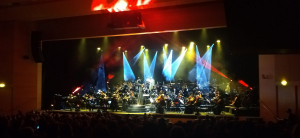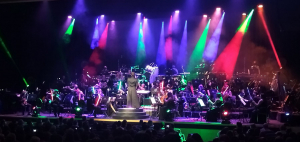Concert ‘Film Symphony Orchestra – FSO – Phoenix Tour’ – Valencia (Spain)
Our colleague Frederic Torres attended the concert held in Valencia (Spain), within the Phoenix 2021-2022 Tour of the Film Symphony Orchestra, and brings us this exclusive article for SoundTrackFest.
Concert - FSO in VALENCIA - PHOENIX TOUR
After having already performed in Madrid and Barcelona, the FSO (Film Symphony Orchestra) came to Valencia on October 23 and 24, 2021, in the framework of the Palace of Congresses and Exhibitions (the auditorium par excellence of the capital of the Turia, the Palau de la Música, is still closed for renovations after several years), to present its new tour called Phoenix, drawing a parallel with the mythological bird that rises from its ashes and returns to “new” normality, after the forced artistic hiatus due to the pandemic.
With a duo of concerts on Saturday 23 (17h and 20h), and a single intervention the following day, Sunday 24 (17h), the FSO returned, then, with the Valencian Constantino Martínez-Orts, its main artistic responsible at the helm of the formation, proposing a show of the same characteristics as the previous ones, namely, with its alternating mix of classical and modern works. The program featured Martínez-Orts’ usual fondness for the eighties, less present on this occasion, as he limited the performance to only the main theme of the popular series of the A-Team, by the competent television composers Mike Post & Pete Carpenter, absolute dominators of the eighties television panorama.
Preceded by each of the interpretations of the pedagogical and enthusiastic introductions by the conductor himself, the show was accompanied by the usual game of colorful and sometimes dazzling stage lights (fascinating for some and capable of distracting too much from the concert for others) trying to give more spectacularity to the grandiose overtures and suites performed throughout the program.
The concert began with nothing less than the “Main Titles” of the series The Mandalorian, by the Swedish Ludwig Görannsson, the spin-off of the Star Wars franchise that has triumphed on the Disney + digital platform.
Alternating with these novelties, we had the “Prelude” from Ben-Hur, the great classic by Miklós Rózsa, competently performed, although it is impossible to revalidate the strength and power of the recordings made by Rózsa himself at the time, or of the official disc, by Carlo Savina, which was commercially released in 1960, after the success of the film.
Back to the present, it was then the turn of the successful series Bridgerton, available on the digital platform Netflix, which offered a representative suite of music composed by Kris Bowers, while Martinez-Orts announced a new show by the FSO based on this series scheduled for the first months of 2022, which promises to recreate, even scenically, the nineteenth-century atmosphere of the program.
From this point on, the selection of the program opted for a series of suites and overtures of modern classics, which opened with the theme “Chevalier de Sangreal”, by the omnipresent Hans Zimmer, from The Da Vinci Code, followed by a suite of music by Don Davis for the seminal Matrix, the best proposal and performance of the program. Not very accommodating music, at times atonal, but very dynamic and representative of the revolutionary film by the Wachowski sisters, and of which the director was very enthusiastic, as his usual artistic attire, the futuristic cassock worn by Neo in the saga, demonstrates, already converted into a major symbol of the FSO.
A suite from The Untouchables by Ennio Morricone, consisting of the main titles, Malone’s theme (played by Sean Connery), and the epic piece dedicated to the FBI group, followed by the majestic and impressionistic “Overture” by the Scottish Patrick Doyle for Much Ado About Nothing, Kenneth Branagh’s splendid version of the Shakespearean classic, which was another of the great moments of the concert, put a stop to the program’s development.
Although it was rather a brief stop, as it continued with the no less usual draw for a trip to Hollywood for the couple able to guess correctly the ten themes fleetingly interpreted by the orchestra, this time all of them belonging to John Williams, who a priori seemed to be left out of the program after the previous tours of the orchestra dedicated to the American Maestro. Afterwards, the concert continued without pauses for intermissions, given the urgency of the second concert of the day (I attended the first one, beginning at five o’clock in the afternoon on Saturday, the 23rd).
The continuation came with this alternation of classic and modern themes, so that it was the “Main Titles” of Alfred Newman‘s How the West Was Won, which opened the second block. Qualified by Martínez-Orts as the best western in history (a highly debatable consideration), the popular theme was well interpreted, although it lacked more forcefulness in the snare drum rolls, which marked the rhythm of the original piece in the film with verve and energy.
From such a characteristic context, we moved on to the interpretation of the sensitive “Buongiorno principessa”, written by Nicola Piovani for Life is Beautiful, which, in addition to giving its author an Oscar in 1998, has become one of the most popular themes in the film-music repertoire.
Following the above-mentioned succession of classics, it was the turn of the “John Wayne “Duke” March”, composed by Dimitri Tiomkin for Circus World, one of the sixties blockbusters that Samuel Bronston produced and filmed in Spain.
After that simple march, Hans Zimmer was again summoned with a “Suite” for Gladiator, one of his most acclaimed scores, which changed the course of film music for better and for worse, and which Martínez-Orts defined as a work of maturity from which the German composer moved on to a new stage in his professional career characterized by great scores such as Inception, Interstellar, etc.
It can be seen in this way, although respecting the legitimate opinion of the director, for me, Zimmer’s peak is precisely in the moments before this work on the epic film by Ridley Scott (a kind of covert remake of Ben-Hur, crossed with Spartacus), with titles of the caliber of The Lion King (which gave him his only Oscar so far), The Prince of Egypt, a score that sapiently combines the orchestral apparatus with great songs, and above all, The Thin Red Line, a masterpiece of hypnotic characteristics with which Zimmer elevated Terrence Malick’s great film to artistic dimensions unparalleled in war cinema. Be that as it may, the suite sounded somewhat rushed, going over the top of the themes almost in the same way as it had done with Williams’ themes for the contest in the intermission of the program.
The sensation would increase with the next three and last suites, belonging to Leonard Bernstein‘s West Side Story, again in fashion due to the imminent release of the version filmed by Steven Spielberg; The Lord of the Rings, Howard Shore‘s masterpiece, and one of the peaks of film music; and Beauty and the Beast, by the Oscar-winning Alan Menken, which went through its main themes like a sigh, with little development beyond the immediate recognition of the audience, in perfect communion with the proposal of Constantino Martínez-Orts.
As an encore, the spectacular theme that Brian Tyler composed in a jazzy key for Iron Man 3, before the inevitable “Cantina Band” theme that serves to close the event, with its arches of lights and the dancing of the members of the orchestra.
An infallible formula in which, for the moment, there is no place in the program for Spanish composers, and which has been consolidated among a “popcorn” audience, which values this show to the same extent that it could attend a circus session, or a soccer match. Worthy of note were the mobile recordings made by the audience at certain moments of the concert, especially of the works by Zimmer, a musician who usually works with synthesizers and who, nevertheless, always appears in the concert programs, not only of the FSO, but of other orchestras that pride themselves on performing film music in concert halls. The world, upside down.
Article and pictures by Frederic Torres
















